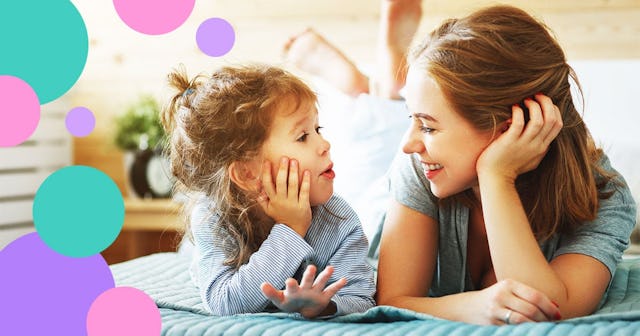'Ask Me About' Conversation Starters Can Get Your Kids Talking After School

The after-school conversation struggle is real, and many parents—and their kids—are over it.
Here’s how it goes. Your kid gets into the minivan or off the school bus. They’re exhausted, cranky, and of course, starving. After they eat all—and I mean all—of the snacks, you ask, “How was your day?” You’re trying to reconnect with your child, but they are completely uninterested.
Your child grunts back something like “fine” or “OK.” So you try again, persisting. “Well, what did you do?” This renders another one-word answer—“Nothing.” Or your kid just shrugs.
Sound familiar?
Parents aren’t having it. Kids aren’t having it. The typical after-school questions aren’t working for any of us. Which is why the “ask me about it” conversation starters are so helpful.
“Ask me about it” conversation starters stem from the e-mail or app messages that teachers send parents, sometimes daily, weekly, or monthly. The teacher outlines the topics that were covered in class during that time frame. They might also issue reminders regarding upcoming field trips, class parties, or rules. Parents can then use these to ask their children specific questions about school.
kali9/Getty
For example, my six-year-old son is currently learning about family units in social studies. I can ask him specific question such as, “What did you learn about families in social studies class today?” Or, “Your teacher told me you’re talking about family diversity. What did you learn about your friends’ families in class today?”
In college, I minored in speech-communication. During an interpersonal communication class, we learned all about the importance of open-ended questions—that is, questions that cannot be answered with a simple “yes” or “no.” Or a grunt or shrug, for that matter.
Open-ended questions offer us opportunities to dig deeper into our kids’ days and have better connections and more detailed conversations. Trusting, empathetic, parent-child relationships thrive on the intimacy created when we truly communicate well with our children. When we ask open-ended questions, we are in our kids’ corner—and not on the other side of the room.
The “ask me about it” conversations are a great way to start opening up the after-school communication with your child. And thankfully, there are additional options for improving the “what’d you do today?” communication.
Another thing I do is ask my children for “three things.” Sometimes it’s, “What three things did you do at school today that you enjoyed?” Yes, sometimes they reply that recess, lunch, and PE were their favorites. That’s cool. I was a kid once, too. If they mention PE, I can ask, “What activity did you do in PE today that was so fun?”
There are other versions of the “three things” questions. You can ask, “What three things gave you joy today?” Or “What are three things you learned today at school?” It’s OK to embrace the challenges by asking your child, “What three things were difficult today?” Math tests are a popular answer in my house. And don’t forget to ask questions about kindness and other social activities–because school isn’t just about academics.
https://www.instagram.com/p/B1GrMcpB7a3/?utm_source=ig_web_copy_link
Sometimes I ask my children who they played with at recess, what did their friends talk about at lunch, or what was the best activity they did in class that day. I also ask, “What happened today that gave you anxiety?” with my child who has an anxiety diagnosis.
Most importantly, after I’ve read the information on what my kids have studied for the day by reading the teacher’s message, I’m able to show my kids that I’m in the loop and in their circle. I truly care about how their day went, what they’re studying, what they’re struggling with, and what their strengths are.
You got that, right? Read the teacher’s messages. It only takes a few minutes.
Think I’m being extra? If you need more convincing, even one of our favorite mom celebs, Busy Philipps, uses the conversation starters with her daughters, Cricket who is five and Birdie who is 10. Philips shared that the e-mail blasts teachers send parents, where they outline what material was covered that week at school, is incredibly helpful to parents.
She responded, “It’s so helpful because I know that if we ever get to a place where Birdie isn’t being open or forthright about her day, I can simply reference the email and say: ‘I read that you were talking about X. What did you think about that?’”
Of course, all of us need a little down time after a hard day’s work, so you don’t need to insist that your child sit down and have a daily run-down convo with you as soon as they step off the school bus or get out of sports practice. Do what works for your family. Discuss their day over dinner, in the car driving to the next extracurricular, or even at bedtime.
The goal is to make sure our kids feel important, loved, and safe. When we talk to them about the minor things, we are teaching our kids that they can come to us with the big stuff when it arises.
And that, friends, is priceless.
This article was originally published on